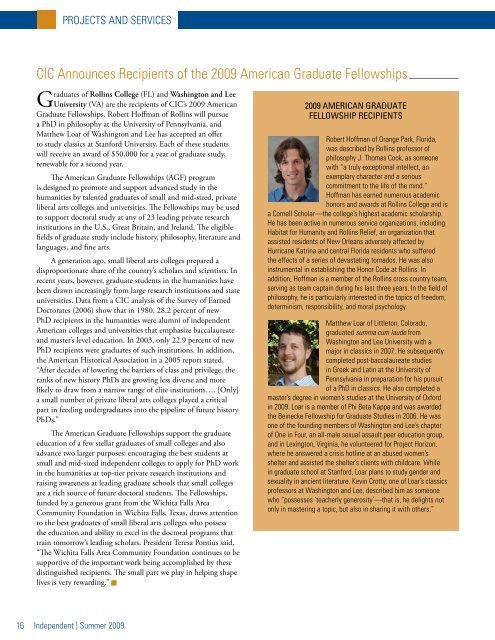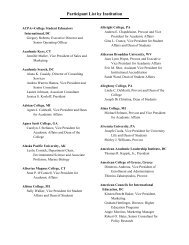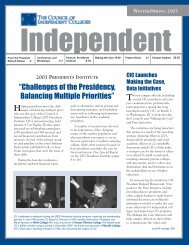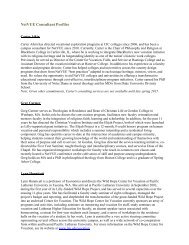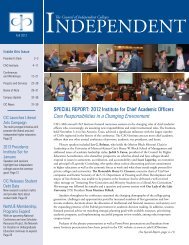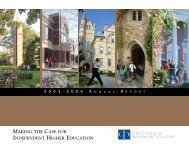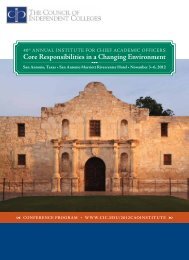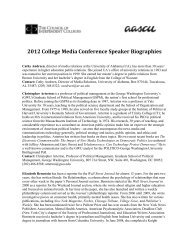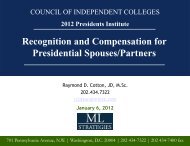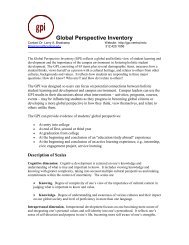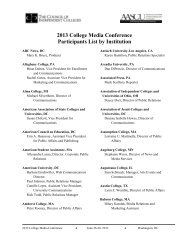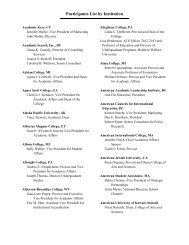Summer 2009 - The Council of Independent Colleges
Summer 2009 - The Council of Independent Colleges
Summer 2009 - The Council of Independent Colleges
You also want an ePaper? Increase the reach of your titles
YUMPU automatically turns print PDFs into web optimized ePapers that Google loves.
Projects and services<br />
CIC Announces Recipients <strong>of</strong> the <strong>2009</strong> American Graduate Fellowships<br />
Graduates <strong>of</strong> Rollins College (FL) and Washington and Lee<br />
University (VA) are the recipients <strong>of</strong> CIC’s <strong>2009</strong> American<br />
Graduate Fellowships. Robert H<strong>of</strong>fman <strong>of</strong> Rollins will pursue<br />
a PhD in philosophy at the University <strong>of</strong> Pennsylvania, and<br />
Matthew Loar <strong>of</strong> Washington and Lee has accepted an <strong>of</strong>fer<br />
to study classics at Stanford University. Each <strong>of</strong> these students<br />
will receive an award <strong>of</strong> $50,000 for a year <strong>of</strong> graduate study,<br />
renewable for a second year.<br />
<strong>The</strong> American Graduate Fellowships (AGF) program<br />
is designed to promote and support advanced study in the<br />
humanities by talented graduates <strong>of</strong> small and mid-sized, private<br />
liberal arts colleges and universities. <strong>The</strong> Fellowships may be used<br />
to support doctoral study at any <strong>of</strong> 23 leading private research<br />
institutions in the U.S., Great Britain, and Ireland. <strong>The</strong> eligible<br />
fields <strong>of</strong> graduate study include history, philosophy, literature and<br />
languages, and fine arts.<br />
A generation ago, small liberal arts colleges prepared a<br />
disproportionate share <strong>of</strong> the country’s scholars and scientists. In<br />
recent years, however, graduate students in the humanities have<br />
been drawn increasingly from large research institutions and state<br />
universities. Data from a CIC analysis <strong>of</strong> the Survey <strong>of</strong> Earned<br />
Doctorates (2006) show that in 1980, 28.2 percent <strong>of</strong> new<br />
PhD recipients in the humanities were alumni <strong>of</strong> independent<br />
American colleges and universities that emphasize baccalaureate<br />
and master’s level education. In 2003, only 22.9 percent <strong>of</strong> new<br />
PhD recipients were graduates <strong>of</strong> such institutions. In addition,<br />
the American Historical Association in a 2005 report stated,<br />
“After decades <strong>of</strong> lowering the barriers <strong>of</strong> class and privilege, the<br />
ranks <strong>of</strong> new history PhDs are growing less diverse and more<br />
likely to draw from a narrow range <strong>of</strong> elite institutions…. [Only]<br />
a small number <strong>of</strong> private liberal arts colleges played a critical<br />
part in feeding undergraduates into the pipeline <strong>of</strong> future history<br />
PhDs.”<br />
<strong>The</strong> American Graduate Fellowships support the graduate<br />
education <strong>of</strong> a few stellar graduates <strong>of</strong> small colleges and also<br />
advance two larger purposes: encouraging the best students at<br />
small and mid-sized independent colleges to apply for PhD work<br />
in the humanities at top-tier private research institutions and<br />
raising awareness at leading graduate schools that small colleges<br />
are a rich source <strong>of</strong> future doctoral students. <strong>The</strong> Fellowships,<br />
funded by a generous grant from the Wichita Falls Area<br />
Community Foundation in Wichita Falls, Texas, draws attention<br />
to the best graduates <strong>of</strong> small liberal arts colleges who possess<br />
the education and ability to excel in the doctoral programs that<br />
train tomorrow’s leading scholars. President Teresa Pontius said,<br />
“<strong>The</strong> Wichita Falls Area Community Foundation continues to be<br />
supportive <strong>of</strong> the important work being accomplished by these<br />
distinguished recipients. <strong>The</strong> small part we play in helping shape<br />
lives is very rewarding.”<br />
<strong>2009</strong> American Graduate<br />
Fellowship Recipients<br />
Robert H<strong>of</strong>fman <strong>of</strong> Orange Park, Florida,<br />
was described by Rollins pr<strong>of</strong>essor <strong>of</strong><br />
philosophy J. Thomas Cook, as someone<br />
with “a truly exceptional intellect, an<br />
exemplary character and a serious<br />
commitment to the life <strong>of</strong> the mind.”<br />
H<strong>of</strong>fman has earned numerous academic<br />
honors and awards at Rollins College and is<br />
a Cornell Scholar—the college’s highest academic scholarship.<br />
He has been active in numerous service organizations, including<br />
Habitat for Humanity and Rollins Relief, an organization that<br />
assisted residents <strong>of</strong> New Orleans adversely affected by<br />
Hurricane Katrina and central Florida residents who suffered<br />
the effects <strong>of</strong> a series <strong>of</strong> devastating tornados. He was also<br />
instrumental in establishing the Honor Code at Rollins. In<br />
addition, H<strong>of</strong>fman is a member <strong>of</strong> the Rollins cross country team,<br />
serving as team captain during his last three years. In the field <strong>of</strong><br />
philosophy, he is particularly interested in the topics <strong>of</strong> freedom,<br />
determinism, responsibility, and moral psychology.<br />
Matthew Loar <strong>of</strong> Littleton, Colorado,<br />
graduated summa cum laude from<br />
Washington and Lee University with a<br />
major in classics in 2007. He subsequently<br />
completed post-baccalaureate studies<br />
in Greek and Latin at the University <strong>of</strong><br />
Pennsylvania in preparation for his pursuit<br />
<strong>of</strong> a PhD in classics. He also completed a<br />
master’s degree in women’s studies at the University <strong>of</strong> Oxford<br />
in <strong>2009</strong>. Loar is a member <strong>of</strong> Phi Beta Kappa and was awarded<br />
the Beinecke Fellowship for Graduate Studies in 2006. He was<br />
one <strong>of</strong> the founding members <strong>of</strong> Washington and Lee’s chapter<br />
<strong>of</strong> One in Four, an all-male sexual assault peer education group,<br />
and in Lexington, Virginia, he volunteered for Project Horizon,<br />
where he answered a crisis hotline at an abused women’s<br />
shelter and assisted the shelter’s clients with childcare. While<br />
in graduate school at Stanford, Loar plans to study gender and<br />
sexuality in ancient literature. Kevin Crotty, one <strong>of</strong> Loar’s classics<br />
pr<strong>of</strong>essors at Washington and Lee, described him as someone<br />
who “possesses ‘teacherly generosity’—that is, he delights not<br />
only in mastering a topic, but also in sharing it with others.”<br />
16 <strong>Independent</strong> | <strong>Summer</strong> <strong>2009</strong>


